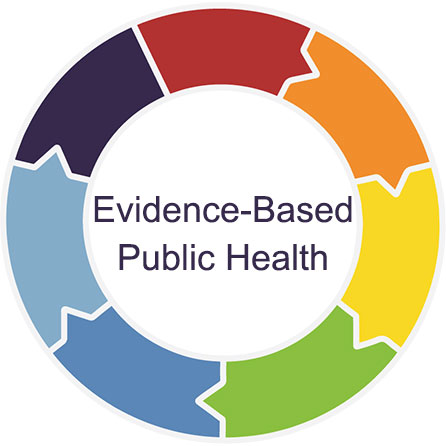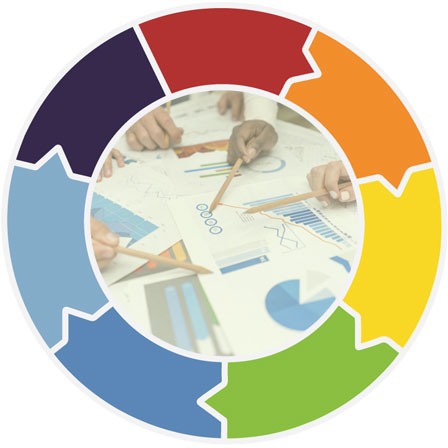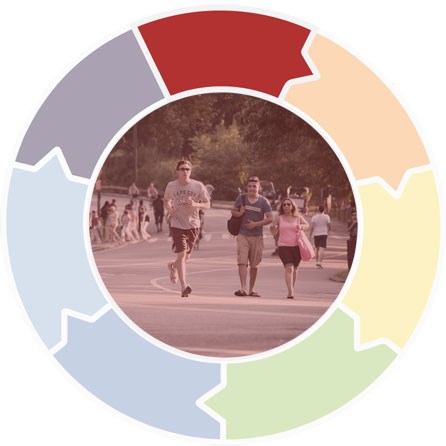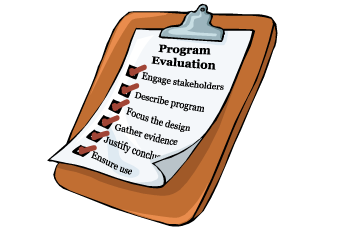Today's public health professionals must be able to strategically consider research results, political interests, and community requests when leading program and policy work. The evidence-based public health framework is an effective model for this type of decision-making.
The Evidence-Based Public Health Training Series consists of nine courses that cover core concepts, such as defining public health issues, conducting community assessments, prioritizing options, and evaluating program and policy impacts. You may take each of the courses individually and receive a certificate for each one. If you choose to complete all nine courses, you will also receive a certificate for the series as a whole.
This training series is brought to you by the Northwest Center for Public Health Practice, the Rocky Mountain Public Health Training Center, and the Prevention and Research Center in St. Louis, Missouri.
A facilitated version of this training is available through the Rocky Mountain Public Health Training Center.
The content of this training was adapted from an in-person training course and based on the work by Ross C. Brownson, PhD.
Estimated time to complete all courses in this series: 10 hours

This is course 1 of the Evidence-Based Public Health Training Series. It is meant to stand alone, but you may also take it together with courses in the series to receive a certificate in Evidence-Based Public Health.
This course provides an introduction to key concepts for evidence-based public health. It offers an overview of the importance of evidence-based public health and its applications in disease prevention and health promotion.
Learning Objectives:
- List three types of evidence that may be used to set priorities in public health
- List two key sources of evidence
- Describe the barriers to evidence-based decision making in public health
Estimated time to complete: 45 minutes

This is course 2 of the Evidence-Based Public Health Training Series. It is meant to stand alone, but you may also take it together with courses in the series to receive a certificate in Evidence-Based Public Health.
Community health assessments help provide insight into the community you serve. They are an important component in helping you determine where to focus resources and interventions. In this course, you will learn more about the components of community health assessments including the types of data commonly used.
Learning Objectives
- Explain the reasons for conducting a community assessment
- Define the components of a community health assessment
- Identify the types of data for assessing the needs and assets of the community of interest
Estimated time to complete: 45 minutes

This is course 3 of the Evidence-Based Public Health Training Series. It is meant to stand alone, but you may also take it together with courses in the series to receive a certificate in Evidence-Based Public Health.
Public health data are used to measure and describe disease in a population. In this course, you will learn about a variety of public health data sources and find out how to search for and interpret relevant data.
Learning Objectives:
- Describe the principles of descriptive epidemiology and surveillance to better measure outcomes in the community
- Find and use various data sources for public health practice
Estimated time to complete: 1 hour

This is course 4 of the Evidence-Based Public Health Training Series. It is meant to stand alone, but you may also take it together with courses in the series to receive a certificate in Evidence-Based Public Health.
A well-written statement of the issue that you are considering can help you achieve your prevention goals and influence your public health interventions. This course will show you how to develop a concise statement about a public health problem, issue, or policy.
Learning Objectives
- Define a criterion for the components of a sound problem statement
- Develop a concise written statement of the public/community health problem, issue, or policy under consideration in a measurable way
Estimated time to complete: 45 minutes

This is course 5 of the Evidence-Based Public Health Training Series. It is meant to stand alone, but you may also take it together with courses in the series to receive a certificate in Evidence-Based Public Health.
The scientific literature on effective interventions is a key tool for evidence-based public health. This course will explain systematic reviews of scientific literature and introduce you to important resources for finding practice-relevant studies.
Learning Objectives
- Understand the process used in systematic reviews and identify key sources
- Become familiar with resources that assist in searching and summarizing the scientific literature
Estimated time to complete: 1 hour

This is course 6 of the Evidence-Based Public Health Training Series. It is meant to stand alone, but you may also take it together with courses in the series to receive a certificate in Evidence-Based Public Health.
In this course, you will learn why it is important to set priorities among various program and policy options. You will examine several methods for prioritizing competing options and will also consider health equity in your prioritization process.
Learning Objectives
- Develop a process for choosing health interventions and policies
- Identify criteria used to select health interventions and policies
- Describe approaches to community and stakeholder involvement in prioritization
- Include health equity as a consideration in prioritization
Estimated time to complete: 45 minutes

This is course 7 of the Evidence-Based Public Health Training Series. It is meant to stand alone, but you may also take it together with courses in the series to receive a certificate in Evidence-Based Public Health.
Economic factors can play an important role in decision-making on public health interventions. This course will show you how to apply economic evaluation to public health decisions. It will cover key terms and the basic steps involved in conducting an economic evaluation.
Learning Objectives
- Explain the differences between types of economic evaluations most often used in public health
- Define key terms used in economic evaluations
- Describe the steps involved in conducting an economic evaluation
Estimated time to complete: 1.75 hours

This is course 8 of the Evidence-Based Public Health Training Series. It is meant to stand alone, but you may also take it together with courses in the series to receive a certificate in Evidence-Based Public Health.
Good planning is an essential part of successful evidence-based interventions. This course will help you understand and use key planning tools for public health, including action planning, logic models, and work plans.
Learning objectives:
- Describe the importance of action planning for program implementation
- Describe the purpose and structure of logic models
- Identify the key components of a work plan
- Apply action planning tools and processes to a real world public health program example
Estimated time to complete: 1 hour

This is course 9 of the Evidence-Based Public Health Training Series. It is meant to stand alone, but you may also take it together with courses in the series to receive a certificate in Evidence-Based Public Health.
In this course, you will learn how to evaluate evidence-based public health programs. We will cover the basic components of program evaluation, including study designs, measurement approaches, and ways of using and sharing evaluation results.
Learning Objectives
- Understand the basic components of program evaluation
- Understand the various types of study designs useful in program evaluation
- Understand the concepts of measurement validity and reliability
Estimated time to complete: 1.5 hours

This course is currently under evaluation for revision and is not available for new enrollments. If you have already registered for this course, you may still access it to receive your certificate.
This online course teaches you how to collect the evidence you need to determine your public health program's impact. These skills allow you to uncover successful and less successful program components and provide information to inform program continuation or the development of other programs.
Estimated time to complete: 3 hours

Indigenous communities have engaged in review and reflection to understand the impact of decisions and activities on community health and well-being since time immemorial. Indigenous evaluation is a long relied upon practice across many Indigenous communities to adjust and improve community-led efforts.
While Indigenous evaluation approaches have been documented for use in educational settings, for violence prevention, for youth well-being, and for other Indigenous public health outcomes, there hasn’t been an actionable guide for implementing Indigenous evaluation approaches. To help you apply Indigenous evaluation approaches, this training translates Indigenous values and knowledge into a cyclical learning process with actionable steps that teams can work through at their own pace.
Estimated time to complete: 2.5 hours

This 45-minute online course shows you how to measure the performance of your local health jurisdiction using logic models and outcome measurement. If you've ever tried to run a marathon, you probably had a plan. That plan might include getting the right running shoes, scheduling your practice runs, eating the right foods, and stepping up your speed as the race draws near. In essence, you've laid out a logic model for a successful outcome. In the same way, your public health efforts will be even better if you plan ahead, assess your progress, make needed changes, and reflect on the outcomes.
Estimated time to complete: 45 minutes

This course is no longer available for new enrollments. Please access Program Evaluation in Public Health instead.
Estimated time to complete: 1.5 hours

This course introduces you to the CDC's Program Evaluation Framework, a step-by-step guide for checking how well public health programs work. You'll learn how to plan evaluations, collect and study information, and use what you find to make programs better. The course focuses on working together with others, being fair, and using what you learn to improve health programs.
Estimated time to complete: 1.5 hours
